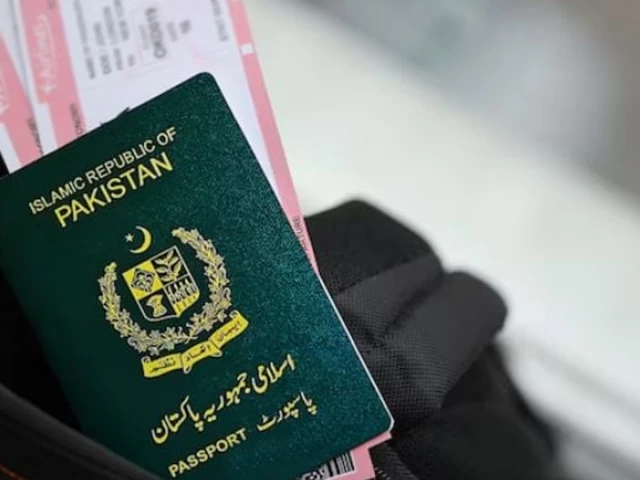For the first time, the United States falls out of the top 10 for passports; UK falls to lowest ever rank, tied with Malaysia
Pakistan’s passport has fallen several places in the latest Henley Passport Index, now ranking 103rd in the world, tied with Yemen. It now has visa-free access to only 31 countries, a sharp drop from its previous ranking of 96th, when 32 countries granted visa-free access to Pakistani passport holders.
The Henley Passport Index, which ranks passports based on the number of destinations their holders can visit without a prior visa, showed that Pakistan’s position has deteriorated amid growing regional competition.
Iraq ranks 104th with access to 29 destinations, Syria 105th with 26 destinations and Afghanistan 106th with access to 24 destinations, all now behind Pakistan in the global rankings.
This decline places Pakistan among the least powerful passports in the world, with fewer countries offering visa-free access. The index highlights a growing disparity between the South Asian nation and more globally connected nations.
Indian passport slips to 85th position
The Indian passport also lost several places in the latest Henley Passport Index rankings, falling to 85th position, tied with Mauritania. The passport now allows visa-free access to just 57 countries, a sharp drop from 77th place earlier this year, when it allowed visa-free access to 59 countries.
This decline reflects a change in the dynamics of global mobility, with India now lagging behind several countries in terms of freedom of movement. The Indian passport’s fall in the rankings highlights continued challenges in ensuring greater international access, despite the country’s growing global influence.
Singapore tops the world rankings
Singapore has retained its position as the world’s strongest passport, with visa-free access to 193 countries, according to the latest Henley Passport Index rankings. South Korea and Japan follow closely, with visa-free access to 190 and 189 countries respectively.
Germany, Italy, Luxembourg, Spain and Switzerland are in fourth place, with access to 188 destinations. These European countries remain competitive, reflecting strong diplomatic and global relations.
Austria, Belgium, Denmark, Finland, France, Ireland and the Netherlands are among the top five, each enjoying visa-free access to 187 destinations. The ranking highlights Asia’s growing influence in global mobility, with Singapore’s passport taking the top spot for the fourth consecutive year.
UK and US fall to all-time low
For the first time since the Henley Passport Index was created twenty years ago, the United States is no longer among the 10 most powerful passports in the world. Once ranked #1 in 2014, the US passport now ranks 12th, tied with Malaysia, with visa-free access to only 180 out of 227 countries.
Likewise, the British passport has fallen to its lowest rank on record, falling from 6th to 8th place since July. Like the United States, the United Kingdom once held the top spot on the index, reaching the top spot in 2015.
“The decline of the US passport and its more recent fall from 10th to 12th position is due to a series of changes in access,” Henley & Partners said. “The loss of visa-free access to Brazil in April, due to a lack of reciprocity, and the exclusion of the United States from China’s growing list of visa waivers, were key factors in this fall.”
The report continues: “Adjustments by Papua New Guinea and Myanmar, along with Somalia’s new e-visa system and Vietnam’s exclusion of the United States from its latest visa-free list, contributed to the final blow, pushing the United States out of the top 10.”
China advances in global passport rankings
China was one of the biggest risers on the iIndex over the past decade, rising from 94th place in 2015 to 64th in 2025. The rise reflects a significant improvement in the country’s visa-free access, which increased by 37 destinations during this period.
“Recent developments, including the granting of visa-free access to Russia, underline Beijing’s current strategy of increased openness,” Henley & Partners said in its report. “China’s initiatives, alongside new agreements with Gulf states, South America and several European countries, consolidate its role as a global mobility power, reinforcing the Asia-Pacific region’s dominance in travel freedom.”
The increase highlights China’s growing diplomatic influence and its strategic efforts to improve the freedom of movement of its citizens. The country’s growing connectivity strengthens its position in global mobility, particularly in the Asia-Pacific region.




